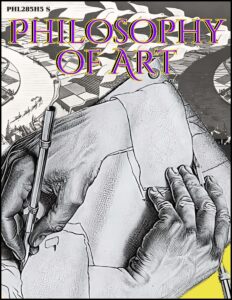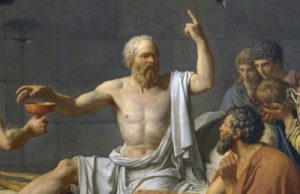
PHL200H5 F – Ancient Philosophy
Instructor: J. Allen T R 1-2 PM
Some core texts of ancient philosophy, concentrating on the work of Plato and Aristotle. Topics include the good life, the soul, knowledge, virtue and the nature of reality. [36L]
Exclusion: PHL200Y5, PHL202H5, PHLB31H3
Prerequisites: PHL101H5 or PHL102H5 or PHL103H5 or PHL113H5 or 4.0 credits.
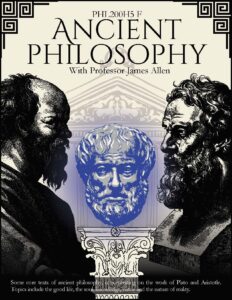
PHL204H5 F – Philosophy in Everyday Life
Instructor: L. Dunford M 3-5 PM/W 4-5 PM
This one-semester course covers philosophical topics that most people talk about, or at least think about, in their everyday lives,—e.g., during conversations with friends, or while watching the news, or when deciding how to vote in an election. Such topics include, for example, the difference between art and pornography, the possibility of life after death, the evolution vs. creationism debate, the ethics of abortion and doctor-assisted suicide, and the possibility of intelligent robots. Each topic will be introduced via relevant public media (e.g., articles from the New York Times series “The Stone” and similar pieces from The Guardian, CBC news, NPR) and other popular sources (e.g., Ted Talks, youtube videos)) and then pursued in several accessible readings from the philosophical literature. A shared “library” of readings for the course will be built up (e.g., on Blackboard) by the instructors and students and updated as new issues of popular interest arise. [36L]
PHL204H5 does not count for credit toward any minor, major, or specialist program in philosophy, but can be taken to fulfill the Humanities breadth/ distribution requirement.
PHL204H5 S – Philosophy in Everyday Life
Instructor: L. Dunford M 6-8 PM/W 6-7 PM
This one-semester course covers philosophical topics that most people talk about, or at least think about, in their everyday lives,—e.g., during conversations with friends, or while watching the news, or when deciding how to vote in an election. Such topics include, for example, the difference between art and pornography, the possibility of life after death, the evolution vs. creationism debate, the ethics of abortion and doctor-assisted suicide, and the possibility of intelligent robots. Each topic will be introduced via relevant public media (e.g., articles from the New York Times series “The Stone” and similar pieces from The Guardian, CBC news, NPR) and other popular sources (e.g., Ted Talks, youtube videos)) and then pursued in several accessible readings from the philosophical literature. A shared “library” of readings for the course will be built up (e.g., on Blackboard) by the instructors and students and updated as new issues of popular interest arise. [36L]
PHL204H5 does not count for credit toward any minor, major, or specialist program in philosophy, but can be taken to fulfill the Humanities breadth/ distribution requirement.
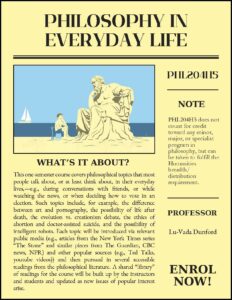
PHL210Y5 Y – 17th and 18th Century Philosophy: Bodies, Souls, God, and Freedom.
Instructor: L. Doerksen/M. Rozemond T/R 10-11 AM
In this course we will explore central themes in early modern philosophy. We will consider questions like: What is the nature of matter? Can everything be explained in terms of matter or should we accept the existence of immaterial things? How should we understand causation? Do we have free will and what is it? What is God’s role in the world? Philosophers in this course include thinkers like René Descartes, Elisabeth of Bohemia, Anne Conway, Baruch Spinoza, Nicolas Malebranche, Gottfried Wilhelm Leibniz, John Locke, Emilie du Châtelet, David Hume, and Immanuel Kant, and the Black philosophers Anton Wilhelm Amo and Ottobah Cugoano.
Exclusion: PHLB35H3.
Prerequisites: PHL101H5 or PHL102H5 or PHL103H5 or PHL113H or 4.0 credits.
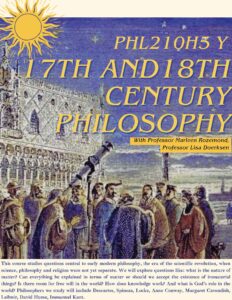
PHL220H5 S – Existentialism
Instructor: O. Ware M 11 AM-1 PM/W 1-2 PM
Human perception and knowledge of reality; freedom and the meaning of human life; sexuality and the body. Authors include Heidegger, Buber, Marcel, Camus, Sartre, de Beauvoir, Merleau-Ponty. [36L].
Exclusion: PHLB30H3
Prerequisites:PHL101H5 or PHL102H5 or PHL103H5 or PHL113H5 or 4.0 credits.
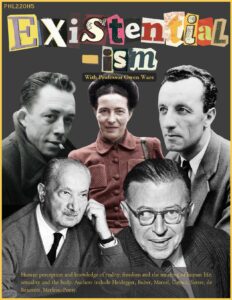
PHL238H5 F – Introduction to South Asian Philosophy [formerly offered as PHL247H]
Instructor: N. Das M 10-11 AM/W 9-11 AM
An introduction to the main philosophical traditions of South Asia, focusing on their historical development and treatment of topics such as devotion, duty, ethics, consciousness, selfhood, suffering, meditation, enlightenment, knowledge, and reality. Readings may include the early Rig Veda, the Upanishads, early Buddhist thought, Jainism, Samkhya-Yoga Philosophy, and Classical Vedanta, among others. [36L]
Prerequisites: PHL101H5 or PHL102H5 or PHL103H5 or PHL113H5 or 4.0 credits
Exclusion: PHL390H5 (Winter 2020) and PHL293H5 (Fall 2020)

PHL239H5 F – Critical Reasoning
Instructor: L. Dunford T 1-3 PM/R 1-2 PM
This course focuses on how to detect bad arguments, improve weak ones, and create good arguments. Skills at identifying, analyzing, improving and creating arguments are critical thinking skills. In this course you will analyze the structure of arguments, identify common fallacies in them, evaluate the strength and weakness of arguments and learn how to improve them, using course terms with precision. [36L]
Exclusion: PHL145H5, TRN200Y1
PHL239H5 S – Critical Reasoning
Instructor: L. Dunford M 4-5 PM/W 3-5 PM
This course focuses on how to detect bad arguments, improve weak ones, and create good arguments. Skills at identifying, analyzing, improving and creating arguments are critical thinking skills. In this course you will analyze the structure of arguments, identify common fallacies in them, evaluate the strength and weakness of arguments and learn how to improve them, using course terms with precision. [36L]
Exclusion: PHL145H5, TRN200Y1
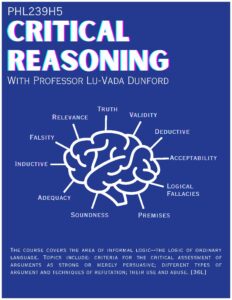
PHL240H5 F – Minds and Machines
Instructor: J. Nagel M 11 AM – 1 PM/W 12-1 PM
Can machines think and feel? Are human beings simply very complicated organic machines? These questions are discussed in the light of recent work on the simulation of intelligence and purposive behaviour.
Prerequisites: PHL101H5 or PHL102H5 or PHL103H5 or PHL113H5 or 4.0 credits.
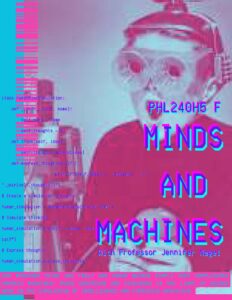
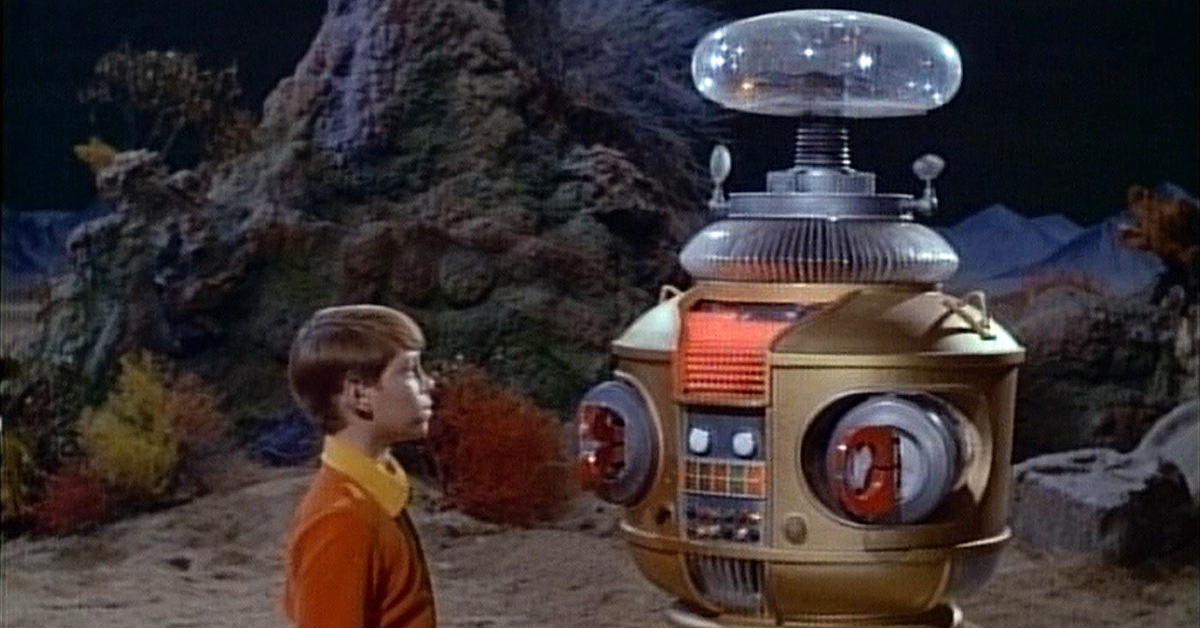
PHL244H5 S – Human Nature
Instructor: TBD T 1-3 PM/R 1-2 PM
Theories of human nature, e.g., psychoanalysis, behaviourism, sociobiology. Current issues, e.g. egoism and altruism, instincts, I.Q., rationality, sanity, and mental illness.
Prerequisites: PHL101H5 or PHL102H5 or PHL103H5 or PHL105Y5 or PHL113H5 or 4.0 credits.
Exclusion: PHLB91H3
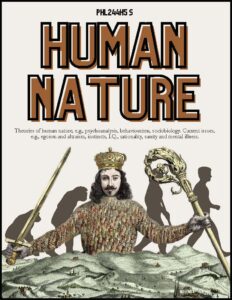
PHL245H5 F – Modern Symbolic Logic
Instructor: TBD W 9-11 AM/F 10-11 AM
The application of symbolic techniques to the assessment of arguments. Propositional calculus and quantification theory. Logical concepts; techniques of natural deduction. [36L]
Exclusion: PHL245H1 or PHLB50H3
Recommended Prep: PHL103H5 or PHL113H5
PHL245H5 S – Modern Symbolic Logic
Instructor: A. Koo W 9-11 AM/F 1-2 PM
The application of symbolic techniques to the assessment of arguments. Propositional calculus and quantification theory. Logical concepts; techniques of natural deduction. [36L]
Exclusion: PHL245H1 or PHLB50H3
Recommended Prep: PHL103H5 or PHL113H5
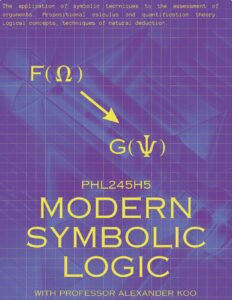
PHL246H5 S – Probability and Inductive Logic
Instructor: J. Weisberg T/R 11 AM-12 PM
The elements of axiomatic probability theory, and its main interpretations (frequency, logical, subjective). Reasoning with probabilities in decision making and science. [36L]
Prerequisites: PHL101H5 or PHL102H5 or PHL103H5 or PHL113H5 or 4.0 credits.
Recommended Prep: PHL245H5
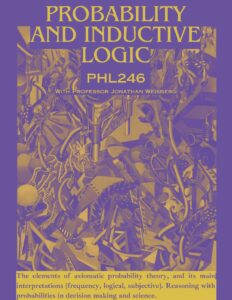
PHL255H5 S – Philosophy of Science
Instructor: A. Koo W 1-3 PM/F 10-11 AM
The nature of science and its development. Topics may include: the contrast between science and religion, between science and pseudo-science; the nature of scientific reasoning; scientific reality; science and objectivity; scientific revolutions; and the interaction between science, society, and values.
Prerequisites: PHL101H5 or PHL102H5 or PHL103H5 or PHL105Y5 or PHL113H5 or 4.0 credits.
Exclusions: PHL252H5 or PHL355H1 or PHLC72H3
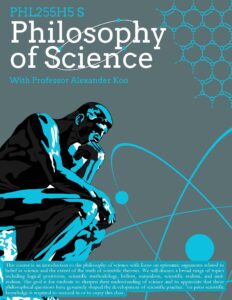
PHL258H5 F – Puzzles and Paradoxes
Instructor: N. Charlow M 2-3 PM/W 1-3 PM
Philosophy often begins with a puzzle or paradox. Zeno once convincingly argued that motion was impossible, but people continue to move. The “liar’s paradox” seems to show that everything is both true and false, but that cannot be right. In this course, we will examine these and related issues. [36L]
Exclusion: PHLB55H3
Prerequisites: PHL101H5 or PHL102H5 or PHL103H5 or PHL113H5 or 4.0 credits.
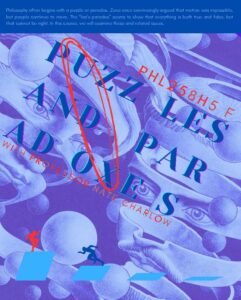
PHL265H5 F – Social and Political Philosophy
Instructor: TBD T/R 9-10 AM
A survey of the major political theorists/theories of the Western philosophical tradition. Questions to be addressed include: Why obey the law? What is justice? What is the best form of government? [36L]
Exclusion: PHL277Y5, PHLB16H3, PHLB17H3
Prerequisites: PHL101H5 or 102H5 or PHL103H5 or PHL113H or 4.0 credits.
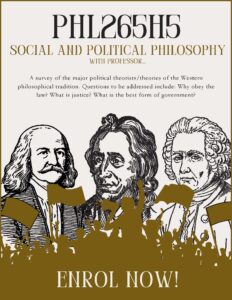
PHL274H5S – Ethics and Society
Instructor: B. Brown T/R 9-10 AM
This course considers two significant aspects of our ethical and social lives. In the first half of the class we consider what it means to be a good employer, employee, or consumer. Do you have to take a job? What do you have to pay the people who work for you? What kind of goods is it morally acceptable for you to buy? In the second half of the class we shift to our romantic lives. What information do you have to share with a person deciding whether to have sex with you? Do people have a right to sell sex? Are marital vows unethical? By the end of this class students should be able to charitably reconstruct and analyze an argument, write a persuasive analytic essay, and identify major positions in these ethical domains.
Prerequisites: PHL101H5 or PHL102H5 or PHL103H5 or PHL105Y5 or PHL113H5 or 4.0 credits.
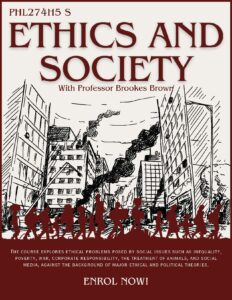
PHL275H5 S – Ethics and Moral Philosophy
Instructor: A. Sepielli M 10-11 AM/W 11 AM – 11 PM
A survey of the major moral theorists/theories of the Western philosophical tradition. Questions to be addressed include: Why be moral? What makes certain actions right or wrong? Can we know what is morally right or wrong? [24L, 12T]
Prerequisites: PHL101H5 or PHL102H5 or PHL103H5 or PHL113H5 or 4.0 credits.
Exclusion: PHL277Y5, PHLA11H3
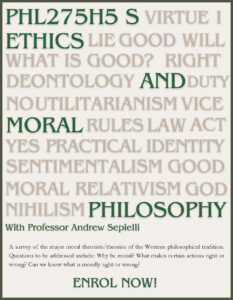
PHL285H5 S – Philosophy of Art
Instructor: TBD
A study of some of the most important philosophical questions about art. For example, what exactly is a work of art? Can any object whatsoever be, or become, an artwork? Who or what determines whether something is art? Does each person decide for themselves, or does a certain community (the “art world”) decide? Can one interpretation or evaluation of a work be better, or more justified, than another? If so, how do we tell which one is better?
Prerequisites: PHL101H5 or PHL102H5 or PHL103H5 or PHL105Y5 or PHL113H5 or 4.0 credits.
Exclusion: PHLB03H3
